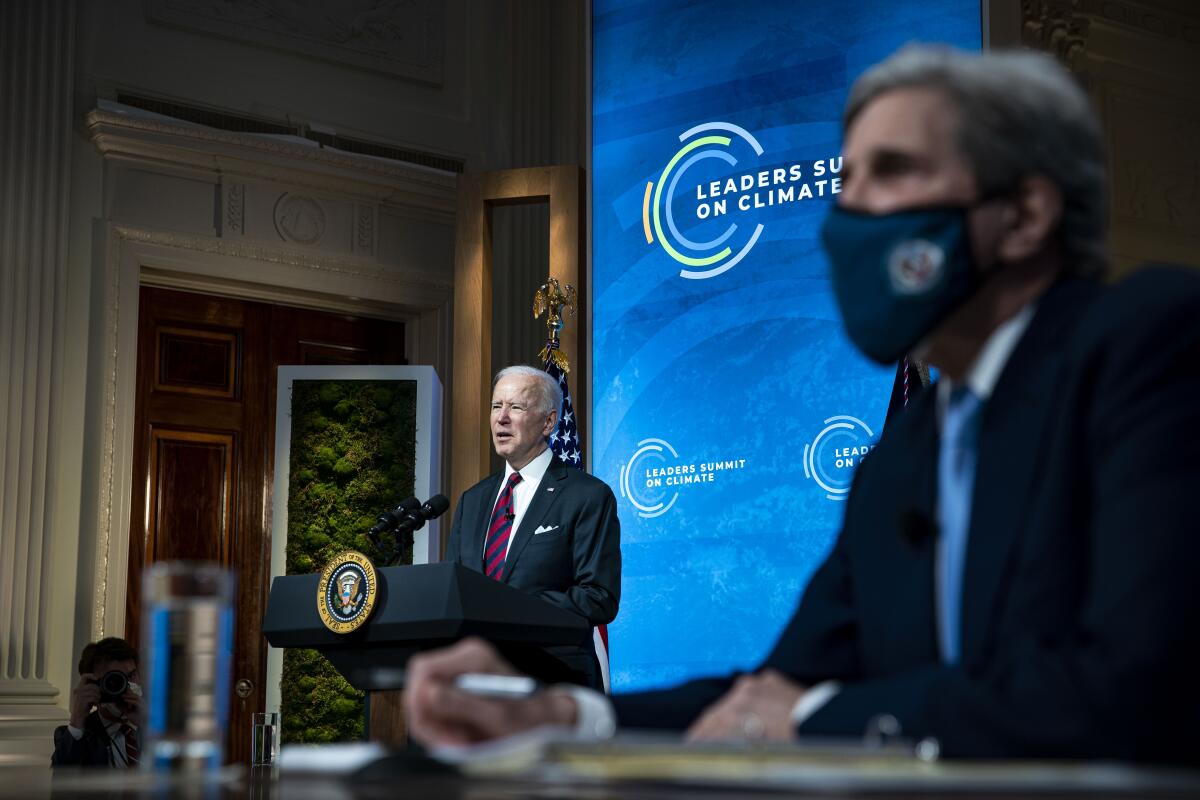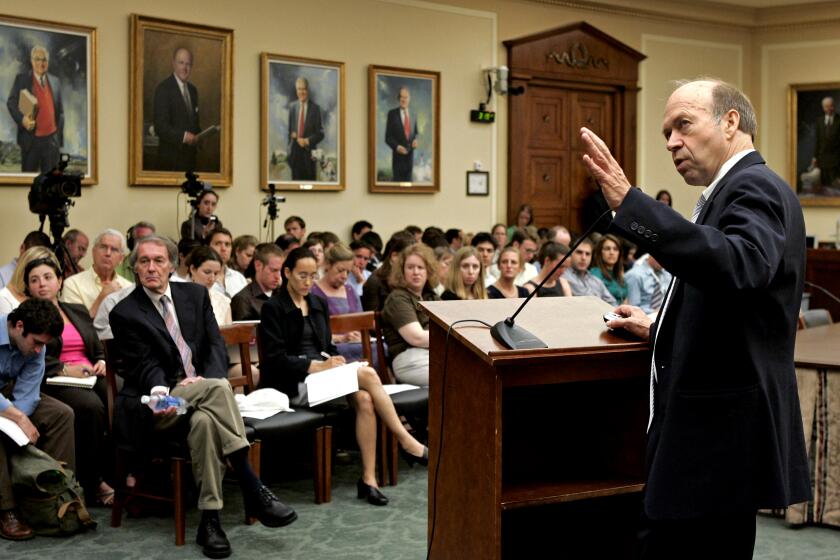How a drilling project and Israel-Hamas overshadow Biden’s climate record for young voters

WASHINGTON — President Biden spent his Earth Day in a national forest this year with an explicit pitch to young people: a climate jobs corps intended to excite Gen Z the way John F. Kennedy’s Peace Corps inspired their grandparents.
Biden took a selfie with Rep. Alexandria Ocasio-Cortez, the progressive New York Democrat, to remind voters that he was the first president to truly embrace elements of her Green New Deal, signing a signature $369-billion spending package in 2022 — the biggest climate bill in American history — to ignite the renewable energy revolution.
But Biden isn’t reaping the political benefits. His lead over former President Trump among voters younger than 30 is down since 2020 — when he won that group by 24 percentage points.
His current lead among those younger voters is somewhere between the single digits and high teens, according to a variety of polls. The Harvard Youth Poll conducted in March found Biden leading by a 19-point margin but found Trump voters (76%) were far more likely to say they were enthusiastic than Biden voters (44%).
And even on the issue of climate, Biden and Trump are statistically tied among voters younger than 30, according to an April CBS poll.

Many young voters don’t know much about Biden’s climate record, and many of the activists who helped fuel his 2020 victory are angry with his approval of a high-profile drilling project in Alaska and his response to the Israel-Hamas war.
“Climate, of course, is one of the most, if not the most, important issues. But because there’s such extreme attention being paid to other issues, it’s maybe getting a little bit less attention,” said Isabel Hiserodt, a 20-year-old senior at Arizona State University.
Though Hiserodt is president of the campus chapter of Young Democrats in a top battleground state, she said she is personally more concerned with abortion access, which is likely to be on a statewide ballot, and Gaza, where she is critical of Biden’s approach. Her choice of Biden is “not necessarily the happiest vote.”
An undecided voter in the process of moving from Arizona to Colorado, 25-year-old Ryan Williams, said he has heard only a little about Biden’s climate agenda but is thinking more intently about the two candidates’ economic policies, the biggest issue for all age groups, according to polls. Climate change ranked 12th among the list of 16 issues in the Harvard poll, which found young voters were most concerned with inflation, healthcare and housing.
It’s “hard to say” how much climate will affect his vote because there are “a lot of different things happening in my life that take priority over researching what’s happening in the government,” said Williams, an aerospace engineer who voted for Trump in 2016 and for Biden in 2020.
The California’s Air Resources Board, who have been mandating emission standards for decades, recently voted to stop selling new gas cars in the state by 2035. But in this political climate, can California continue to lead the way?
Part of the challenge for Biden is the nature of environmental policy. Biden’s boldest changes are often buried in the language of regulatory process — such as a recent change in the rule that requires fossil fuel plants to cut their emissions. Wonky rules that curb the impact of fossil fuels are far less compelling on social media than the Biden administration’s decision last year to allow the drilling project in Alaska, which inspired protest posts that drew hundreds of millions of views on TikTok and elsewhere.
Many of the promised factories, jobs, car charging networks and cost savings in the $369-billion environmental spending law known as the Inflation Reduction Act — and a second $1-trillion infrastructure law — will take years to achieve, and may not be linked to Biden by voters.
The law also gives thousands of dollars in tax credits for electric cars and energy-saving home improvements such as solar panels. But younger voters are not likely to own homes and even discounted, used or leased electric vehicles may be out of reach.
“That is a way that is super direct. You go and buy something and you get money back. Well, that’s barely just started,” said Pete Maysmith, senior vice president of campaigns at League of Conservation Voters, which is spending $120 million to promote Biden and other candidates this year.

Maysmith’s group is trying to appeal to young voters with an animated YouTube video about how “Biden bodied big oil” by pausing new liquid natural gas export terminals. It uses stick figures with Biden’s head, stomping an energy plant with a stick foot.
Environmental advocacy groups are largely rallying around Biden and hope that as the election nears, they can draw a contrast with Trump, who has called climate change a hoax and nonsense.
Trump made the coal industry the centerpiece of his 2016 campaign and has pledged to reverse Biden’s initiatives to reduce fossil fuel plant emissions, adopt electric vehicles and limit oil and gas drilling. He reversed more than 100 environmental regulations, withdrew from the international Paris climate accord during his first term, and has promised a second term would include the repeal of Biden’s climate bill.
“It’s a contrast story,” said David Kieve, president of EDF Action, the advocacy partner of the Environmental Defense Fund. “We’ve got to remind folks of what an awful president on climate Donald Trump was.”
Jack Pratt, who runs EDF’s super PAC that will spend $3 million to $6 million on the race, said the youngest voters, who came of age during a high time of skepticism in politics, need to hear about Biden’s record as part of a broader case that he has gotten things done.
Arizona voters will decide on a ballot measure in November that could mean tax refunds for property owners if cities fail to tackle homeless encampments.
NextGen America, a youth-focused group funded by California billionaire Tom Steyer, is including social media influencers as part of a “surround sound” approach to swaying young voters in eight, largely battleground states. Their swing state polling has shown the vast majority of young voters have heard of the Inflation Reduction Act but do not connect it with Biden.
The Biden campaign is deploying a multipronged approach to these voters that includes hitting college campuses, summer concerts and other places, on and off-line, where they can reach people, according to an official who would speak only without attribution. The message will be intertwined with arguments about the economy and other concerns because young people are not single-issue voters.
Adam Met, of the indie pop band AJR, has visited campuses, posted videos and held events touting Biden’s climate record while touring.
Rep. Ro Khanna agrees there’s work to do. The progressive Democrat from Fremont and Green New Deal supporter recently went on a college tour for the Biden administration in Wisconsin, another battleground, and said he observed that climate was a second-tier issue, mentioned alongside Gaza, behind abortion and the economy.

“We have to do a better job of reaching in ways that we capture their attention and we have to show up more,” he said. “I mean, some of these college campuses, no one had been there because they were in rural communities.”
For many young voters, the void is being filled with criticism. Social media influencers were incensed that Biden’s administration last year approved a drilling project, known as the Willow Project, on Alaska’s North Slope. Videos urging the administration to reject it elicited more than a million letters of opposition.
Elise Joshi posted one of the first TikToks about Willow, drawing more than 300,000 views.
“Biden isn’t a climate champion if he approves an oil drilling project,” she wrote in the title caption.
The 21-year-old recent UC Berkeley grad leads a group called Gen-Z for Change that was initially formed with a social media account called “TikTok for Biden” to oppose Trump. She has been heavily courted by the Biden administration, invited twice to the White House, including the signing ceremony for the Inflation Reduction Act.
She now says her support for Biden is a complicated question, both because of frustration over Willow and the Israel-Hamas war. She interrupted a speech to youth voters by White House Press Secretary Karine Jean-Pierre to protest the drilling last summer.
A scientist went viral with a thread on the inexcusable lack of funding for climate science communications.
“Objectively speaking, the most famous climate thing they’ve done is approving the Willow project,” Joshi said. “They’re working back from that.”
Joshi and other climate activists give the administration credit but “we need 10 IRAs in the next 15 years if we want to actually achieve our goals,” she said, using the acronym for the Inflation Reduction Act.
Zoe Blocher-Rubin, another active Democrat at Arizona State University, agreed the social media blitz around Willow was “pretty overwhelming.” But like other social media outrages, it has faded. She and her peers are now more concerned with Gaza and abortion rights.
“Obviously, climate is important too,” she said. “But we’re used to people not taking enough action.”
More to Read
Get the L.A. Times Politics newsletter
Deeply reported insights into legislation, politics and policy from Sacramento, Washington and beyond. In your inbox three times per week.
You may occasionally receive promotional content from the Los Angeles Times.














